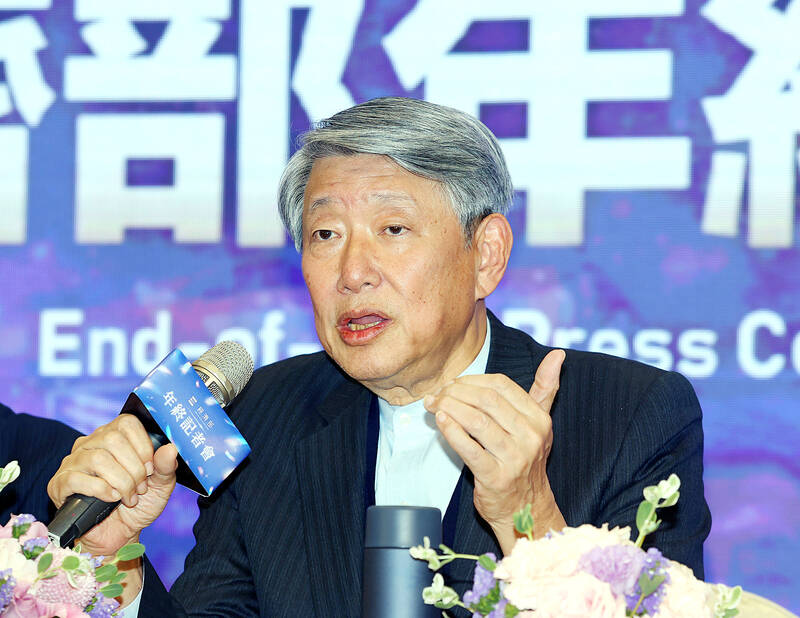Taiwan Semiconductor Manufacturing Co (TSMC, 台積電), a major chip supplier to Nvidia Corp, would no longer be restricted from investing in next-generation 2-nanometer chip production in the US, the Ministry of Economic Affairs said yesterday.
However, the ministry added that the world’s biggest contract chipmaker would not be making any reckless decisions, given the weight of its up to US$30 billion investment.
To safeguard Taiwan’s chip technology advantages, the government has barred local chipmakers from making chips using more advanced technologies at their overseas factories, in China particularly.

Photo: CNA
Chipmakers were previously only allowed to produce chips using less advanced technologies, specifically those that were at least two generations less advanced than those being used domestically, it said.
“Those were old-time rules. Times have changed,” Minister of Economic Affairs J.W. Kuo (郭智輝) said on the sidelines of a ministry media briefing yesterday.
“Private businesses should make their own business decisions based on their own technological progress,” Kuo said.
“The basic principle is that businesses can make profits from their overseas investments,” Kuo said. “TSMC is building factories in the US with the aim of serving its US customers, as 60 percent of the world’s chip-designing companies are based in the US.”
TSMC would “cautiously” evaluate the possibility of investing in building a 2-nanometer fab in the US, which would cost US$28 billion to US$30 billion, Kuo said, adding that TSMC would not yield under pressure from the incoming US government, or rush to build such an advanced chip manufacturing fab in the US.
TSMC has said its second fab in Arizona would produce chips using 2-nanometer and 3-nanometer technology in 2028, after the first fab begins production of 4-nanometer technology in the first half of this year.
The third fab would produce chips using 2-nanometer or more advanced processes, with production beginning by the end of the decade. The investment in Arizona would surpass US$65 billion, it said.
The ministry’s top priority this year is to build a global semiconductor supply chain in collaboration with the US, Germany, Japan and the Philippines, Kuo said.
In Japan, the ministry plans to create an office in Fukuoka, which is about a two-hour drive from Kumamoto, where TSMC is building two chip factories, to assist local semiconductor-related companies in setting up operations in Japan, Kuo said.
The ministry is set to sign an agreement with a private organization on behalf of the Japanese government in the first quarter or second quarter to safeguard Taiwanese companies’ interests, he said.
Commenting on the impact of possible changes in US trade policy, Kuo said the new tariffs proposed by US president-elect Donald Trump would have a relatively minor impact on Taiwanese exporters and export orders, given their strong technological capabilities.
Export orders this year might grow compared with last year, particularly as local companies benefit from the US-China trade row, he said, adding that domestic manufacturers are replacing their Chinese counterparts in supplying goods to US companies, while also allocating more production back to Taiwan, he said.
“Trump will only be in office for four years and can’t run for another term so his impact will be limited,” Kuo said.
Additional reporting by Bloomberg

Sweeping policy changes under US Secretary of Health and Human Services Robert F. Kennedy Jr are having a chilling effect on vaccine makers as anti-vaccine rhetoric has turned into concrete changes in inoculation schedules and recommendations, investors and executives said. The administration of US President Donald Trump has in the past year upended vaccine recommendations, with the country last month ending its longstanding guidance that all children receive inoculations against flu, hepatitis A and other diseases. The unprecedented changes have led to diminished vaccine usage, hurt the investment case for some biotechs, and created a drag that would likely dent revenues and

Global semiconductor stocks advanced yesterday, as comments by Nvidia Corp chief executive officer Jensen Huang (黃仁勳) at Davos, Switzerland, helped reinforce investor enthusiasm for artificial intelligence (AI). Samsung Electronics Co gained as much as 5 percent to an all-time high, helping drive South Korea’s benchmark KOSPI above 5,000 for the first time. That came after the Philadelphia Semiconductor Index rose more than 3 percent to a fresh record on Wednesday, with a boost from Nvidia. The gains came amid broad risk-on trade after US President Donald Trump withdrew his threat of tariffs on some European nations over backing for Greenland. Huang further

CULPRITS: Factors that affected the slip included falling global crude oil prices, wait-and-see consumer attitudes due to US tariffs and a different Lunar New Year holiday schedule Taiwan’s retail sales ended a nine-year growth streak last year, slipping 0.2 percent from a year earlier as uncertainty over US tariff policies affected demand for durable goods, data released on Friday by the Ministry of Economic Affairs showed. Last year’s retail sales totaled NT$4.84 trillion (US$153.27 billion), down about NT$9.5 billion, or 0.2 percent, from 2024. Despite the decline, the figure was still the second-highest annual sales total on record. Ministry statistics department deputy head Chen Yu-fang (陳玉芳) said sales of cars, motorcycles and related products, which accounted for 17.4 percent of total retail rales last year, fell NT$68.1 billion, or

Macronix International Co (旺宏), the world’s biggest NOR flash memory supplier, yesterday said it would spend NT$22 billion (US$699.1 million) on capacity expansion this year to increase its production of mid-to-low-density memory chips as the world’s major memorychip suppliers are phasing out the market. The company said its planned capital expenditures are about 11 times higher than the NT$1.8 billion it spent on new facilities and equipment last year. A majority of this year’s outlay would be allocated to step up capacity of multi-level cell (MLC) NAND flash memory chips, which are used in embedded multimedia cards (eMMC), a managed